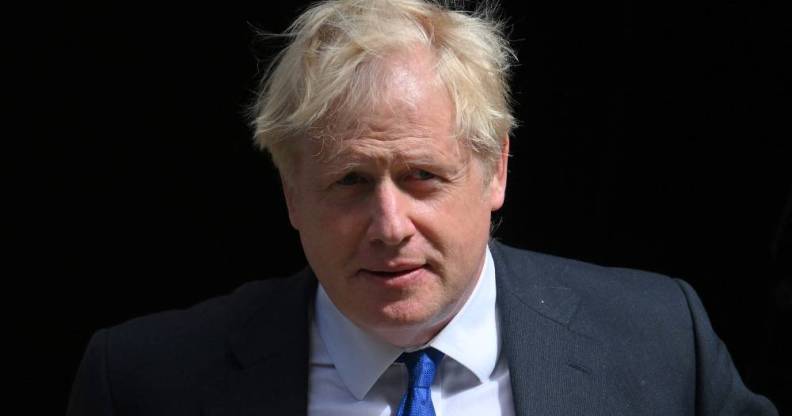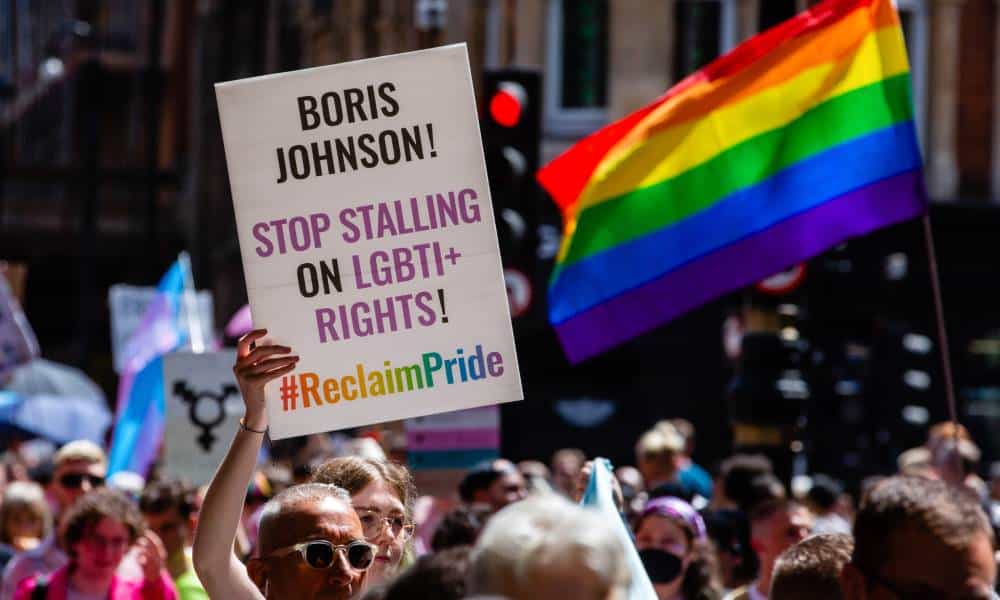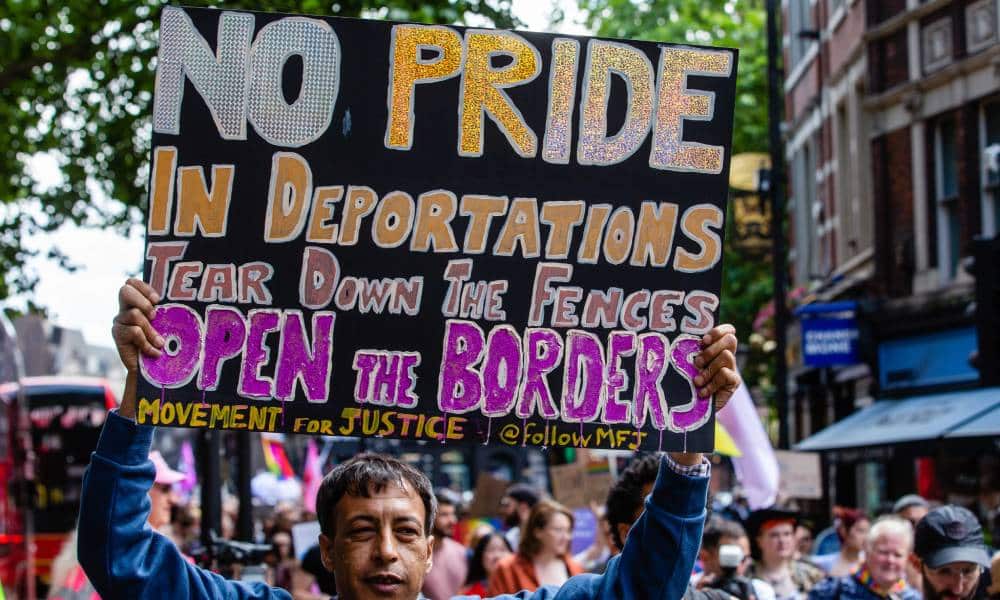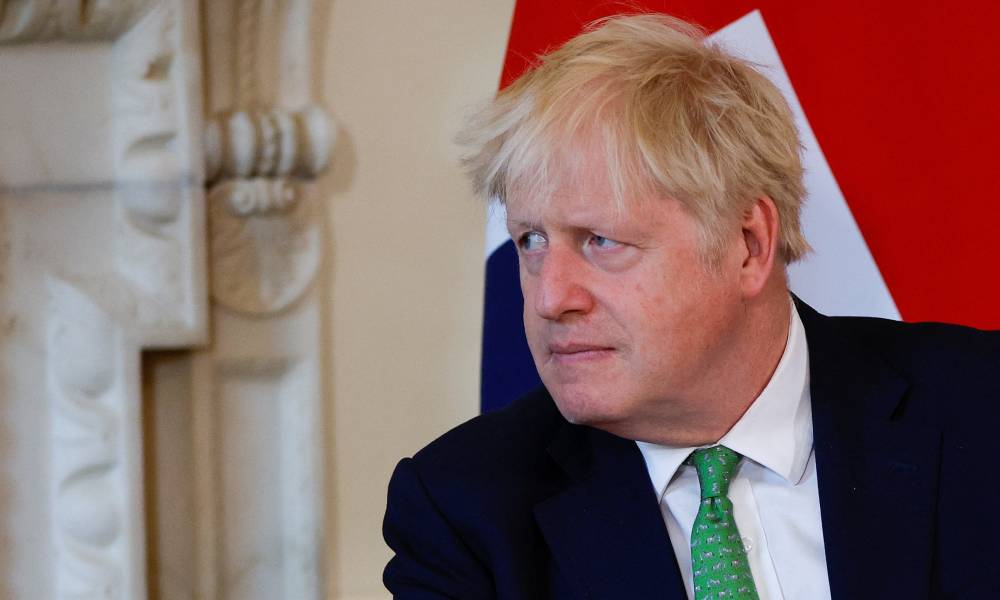Boris Johnson’s LGBTQ+ legacy: The good the bad, and the overwhelmingly ugly

Prime minister Boris Johnson and the Conservative Party have a precarious relationship with the LGBTQ+ community. (Daniel Leal/AFP via Getty)
Boris Johnson has resigned, leaving in his wake a deeply fractured relationship between the Tories and the LGBTQ+ community.
Boris Johnson confirmed on Thursday (7 July) that he is resigning as Tory leader and will stand down as prime minister once a successor is chosen. The announcement comes after the majority of his cabinet either resigned or told him time was up, Johnson’s mishandling of allegations against disgraced MP Chris Pincher making his position untenable.
It’s a meteoric fall from grace for Johnson, who in 2019 won an 80-seat majority. But it will come as welcome news to the LGBTQ+ community, who have been undermined, singled out and attacked by him and his administration.
His attitude to LGBTQ+ rights is hardly surprising, considering that Johnson has repeatedly refused to apologise for referring to gay men as “tank-topped bum boys” in a 1998 Telegraph column about gay MP Peter Mandelson, and has increasingly used trans rights to fuel a culture war. The remarks have haunted him throughout his time as prime minister and soured his relationship with the LGBTQ+ community from the start.
There have been some wins for the LGBTQ+ community under Boris Johnson’s government
One of the biggest wins of recent years has been the introduction of compulsory LGBTQ-inclusive sex and relationships education. As of September 2020, the Conservative government has required all schools to teach the protected characteristics of the Equality Act 2010 as they apply to relationships.
The government also eased blood donation rules for gay, bisexual and queer men in 2021. LGBTQ+ advocates have long pointed out that archaic blood donation bans or deferral periods for queer men are unnecessary, discriminatory and rooted in outdated guidelines from the HIV epidemic.
Boris Johnson’s government introduced the Armed Forces Bill 2021, which automatically pardoned those within the UK military who were convicted of historic gay sex offences. This finally fixed centuries-old legislation that was used to criminalise queer men, destroying the lives and livelihoods of hundreds.
It was also announced that military personnel dismissed on grounds of homosexuality will be able to have their service medals restored if they had been taken away.
The bill came after the 2017 Turing’s Law – named after the wartime codebreaker Alan Turing who was convicted of gross indecency for homosexual acts in 1952. The act gave automatic pardons to deceased men convicted of since-abolished sexual offences, but it was reported that fewer than 200 people had received pardons two years after the law passed.

There have been wins for the LGBTQ+ community under the Tories, but advocates have called on Boris Johnson to continue fighting for LGBTQ+ rights. (Mark Kerrison/In Pictures via Getty)
Mostly, there have been massive steps back for the queer community.
The Home Office has been increasingly hostile towards LGBTQ+ asylum seekers in recent years. Queer refugees are routinely denied asylum, including 25 queer men from Afghanistan forced to flee their homes since 2017.
LGBTQ+ people seeking asylum in the UK have faced repeated mockery and derision during Home Office processes, been told they “aren’t gay enough” to warrant asylum and been told they couldn’t possibly be lesbian because they are also Christian.
The Tories’ Nationality and Borders Act 2022 has made it even harder for LGBTQ+ people to seek safety in the UK and increased the likelihood they could be refused asylum. Asylum seekers previously needed to prove there was a “reasonable degree of likelihood” they’d be persecuted, but under the new act, the burden of proof has been raised to a much higher “balance of probabilities”.
Recently, a gay man was deported to Nigeria where he faced near-certain death.
The Home Office is also pushing ahead with an immigration scheme that will deport some asylum seekers to Rwanda despite the government acknowledging queer people face discrimination there.

The Tory government has made it increasingly more difficult for LGBTQ+ people to gain asylum in the UK. (Mark Kerrison/In Pictures via Getty)
Boris Johnson’s time in office has increasingly been fuelled by anti-trans rhetoric
The government ditched planned reforms to the Gender Recognition Act (GRA) which would have made the process of changing a trans person’s legal gender more straightforward.
In 2020, equalities minister Liz Truss announced she was abandoning meaningful reforms to the GRA in favour of digitising the process for legal gender recognition and reducing the fee.
The Women and Equalities Select Committee launched an investigation into GRA reform shortly afterwards, and its scathing report on the failings of the Tory government was released in December 2021.
The report recommended the government remove the “gender dysphoria” requirement and shift to a self-declaration system; remove requirement for trans people to live in their “acquired gender” for two years before applying for legal gender recognition; reviewing the “currently opaque” Gender Recognition Panel and consider replacing it; publish new guidance on single-sex and separate-sex exemptions that can be applied under the Equality Act; develop a healthcare strategy for trans and non-binary people; and commit to implementing the LGBT Action Plan.
Yet, there has been glacial movement by the Tories on any meaningful change to this system despite the inquiry calling on the government to enact reform by 2023.
Conversion therapy fiasco
Johnson was constantly in hot seat after he abandoned a long-promised legislative ban on conversion therapy. After blistering backlash, the prime minister U-turned, but said he would not protect trans people in the ban.
The Conservative government was forced to cancel its flagship LGBTQ+ rights conference, which was set to take place this year, after a wave of advocacy groups pulled out in response to the conversion therapy ban fiasco.
Boris Johnson defended his decision to exclude trans people from the ban on conversion therapy as he claimed there are “complexities and sensitivities” when moving from the “area of sexuality to the question of gender”.
He has also argued trans women shouldn’t be allowed to compete in women’s sports, which he believed was a “sensible option”.
Under Johnson’s leadership, hate crimes against LGBTQ+ Brits have skyrocketed, and the UK has plummeted down LGBTQ+ advocacy group IGLA-Europe’s rankings of LGBTQ-friendly nations, falling from first place in 2014 to 14th this year.
In recent months, Johnson has begun parroting common anti-trans talking points.
The LGBTQ+ community widely condemned Johnson when, during PMQs on 23 March, he declared that the “basic facts of biology remain overwhelmingly important” when it “comes to distinguishing between a man and a woman”.
Just a few days later, on 29 March, Johnson was criticised for reportedly making a crude joke at the trans community’s expense during a dinner for the Conservative Party.
He began his speech to Tory MPs by welcoming “ladies and gentlemen, or as Keir Starmer would put it, people who are assigned female or male at birth”.

Boris Johnson has repeatedly shown that he is not an ally to the LGBTQ+ community. (Getty/John Sibley – WPA Pool)
Johnson’s distasteful comment came just hours before Jamie Wallis, MP for Bridgend, came out as trans in a statement posted on Twitter on 30 March.
In May, Johnson used a mocking remark about trans women to deflect from answering a pressing question about the cost of living crisis.
He doubled down on his anti-trans remarks in June after he said women can’t be born with a penis and appeared to support a ban on trans women taking part in elite swimming.

